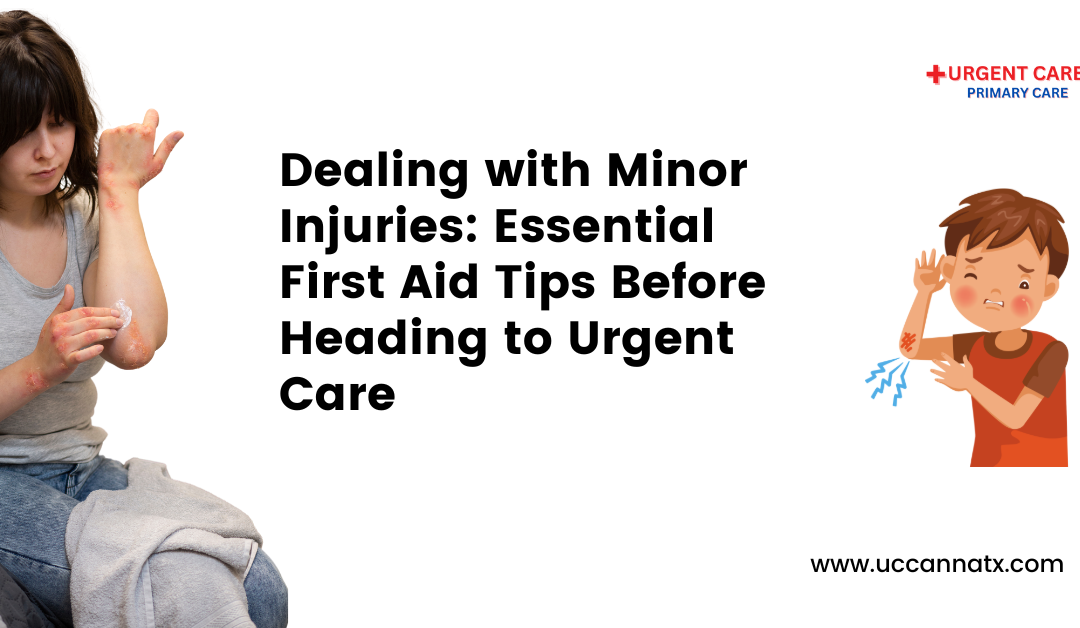Table of Contents
Minor injuries are an inevitable part of life. Whether it’s a kitchen mishap, a playground tumble, or a sports-related strain, knowing how to administer basic first aid can make a significant difference in the outcome and your comfort level before seeking professional medical attention. This guide provides comprehensive first aid tips for common minor injuries, empowering you to take action and promote healing while deciding if a trip to urgent care is necessary.
Understanding the Importance of First Aid
First aid isn’t just about treating the injury itself; it’s about providing immediate care to stabilize the situation, reduce pain, and prevent further complications. Prompt and appropriate first aid can:
- Control Bleeding: Applying pressure and using bandages can help stop blood loss.
- Prevent Infection: Cleaning wounds and using antiseptics can reduce the risk of infection.
- Reduce Pain and Swelling: Ice packs and elevation can help alleviate pain and swelling.
- Provide Comfort and Reassurance: Knowing how to help can make a big difference in a stressful situation.
Essential First Aid Supplies
Having a well-stocked first aid kit at home, in your car, and at work can ensure you’re prepared for minor injuries. Here are some essentials to include:
- Adhesive bandages (assorted sizes)
- Sterile gauze pads and adhesive tape
- Antiseptic wipes or solution
- Antibiotic ointment
- Hydrocortisone cream (for insect bites and rashes)
- Pain relievers (e.g., acetaminophen or ibuprofen)
- Instant cold packs
- Tweezers
- Scissors
- Disposable gloves
- First aid manual
First Aid for Common Minor Injuries
Let’s delve into specific first aid measures for common injuries you might encounter:
- Cuts and Scrapes:
- Wash your hands thoroughly with soap and water.
- Clean the wound with cool water and mild soap.
- Apply pressure with a clean cloth to stop bleeding.
- Apply antibiotic ointment and cover with a bandage.
- Minor Burns:
- Cool the burn under cool (not cold) running water for 10-15 minutes.
- Apply a cool, wet compress if running water isn’t available.
- Don’t apply ice directly to the burn.
- Cover loosely with a sterile gauze bandage.
- Sprains and Strains:
- R.I.C.E.: Rest, Ice, Compression, Elevation.
- Rest the injured area.
- Apply ice packs for 15-20 minutes at a time, several times a day.
- Use a compression bandage to reduce swelling.
- Elevate the injured area above heart level.
- Insect Bites and Stings:
- Remove the stinger if present (scrape with a credit card, don’t squeeze).
- Wash the area with soap and water.
- Apply a cold compress to reduce swelling.
- Use hydrocortisone cream to relieve itching.
- Take an antihistamine if allergic reactions occur.
- Nosebleeds:
- Sit upright and lean forward slightly.
- Pinch the soft part of the nose firmly for 10 minutes.
- Apply a cold compress to the bridge of the nose.
When to Seek Professional Medical Help
While first aid is valuable, it’s crucial to recognize when a minor injury requires professional attention. Seek medical help if:
- Bleeding is severe or doesn’t stop after 10 minutes of pressure.
- The wound is deep, gaping, or dirty.
- Signs of infection develop (e.g., redness, swelling, pus, fever).
- The injury involves the head, neck, or spine.
- You have concerns about tetanus immunization.
Prevention is Key
While accidents happen, many minor injuries can be prevented with simple precautions:
- Wear protective gear during sports and activities.
- Use caution in the kitchen (e.g., pot holders, sharp knives).
- Keep walkways clear and well-lit to prevent falls.
Empowering Yourself with Knowledge
By learning basic first aid techniques, you become an active participant in your own well-being and the safety of those around you. Remember, first aid is the initial step, not a substitute for professional medical care. When in doubt, always err on the side of caution and seek medical advice whenever required visit Urgent Care & Primary Care Clinic, Frisco or call us at Phone: (469) 430-0760 .


Recent Comments